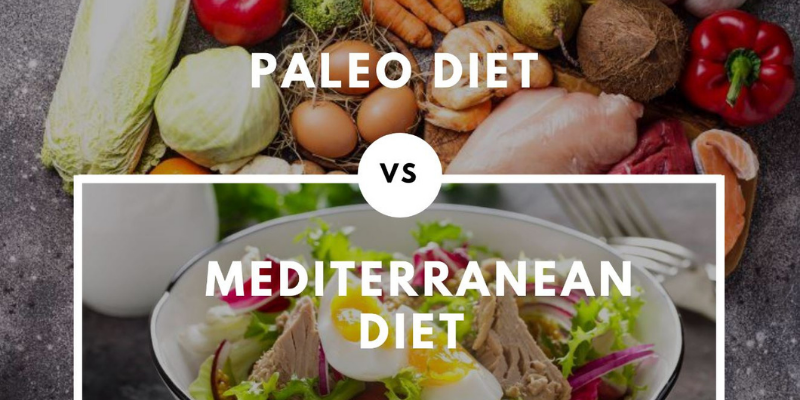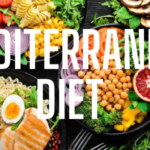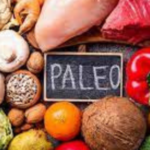Paleo vs Mediterranean Diet – Which Is Better?
Welcome to my Paleo vs Mediterranean diet article. Both diets are gaining popularity these days, so we will give the details to you. Enjoy.

Paleo vs Mediterranean Diet Introduction
The Paleo diet is based on the principles of eating only foods that were available to Paleolithic humans and avoiding anything developed in the last 10,000 years (including grains, dairy, legumes, and processed oils). Meanwhile, the Mediterranean diet emphasizes the health benefits of eating unsaturated fats found in fish, seafood, nuts, extra virgin olive oil, and plants from the region, all of which are low in saturated fat and high in heart-healthy phytochemicals.
Which of these diets has more to offer? Take a look at these facts and figures comparing them side by side!
Choosing a Healthy Lifestyle Isn’t Always Easy
There are many ways you can live a healthy lifestyle. The Mediterranean diet and Paleo diet are two of them. Each is unique in its own way, but they both share several similarities that make them both beneficial to your overall health. As long as you know what your choices should be and why they’re good for you, it’s easier to stick with a choice.
For example, Mediterranean style eating patterns have been shown to reduce cancer risk as well as mortality due to cardiovascular disease and stroke. The consensus is clear: A ‘Mediterranean style’ diet has numerous benefits, says Alice Lichtenstein, DSc, professor of nutrition science and policy at Tufts University.
The Goals Of These Diets Are Different
They both want to get you to lose weight, but that’s about where their similarities end. The goals of these diets are different; one is focused on choosing healthy foods, while other is focused on eating like our ancestors. The main goal of a Paleo diet is to eat unprocessed and whole foods in order to limit disease causing hormones and pesticides in your food.
By avoiding highly processed foods, you’ll also reduce your risk of diabetes and heart disease. While some people believe that following a Paleo diet means cutting out all grains, legumes, dairy products and sugar from your diet, there isn’t really an official list of what you can or cannot eat. You can still enjoy sweet potatoes as long as they aren’t fried or covered with butter. You can even have chocolate if it doesn’t contain any added sugars or chemicals.
Just make sure it’s organic so you don’t consume too many pesticides with your treat! On the other hand, if you follow a Mediterranean diet (MedDiet), then you will be consuming more fruits and vegetables than meat because meat is considered to be just another side dish in that type of diet.
Check out Mediterranean Diet books on Amazon here
The Pros and Cons Of Each Diet
We’ll go over what makes each diet unique and talk about how to make them work for you. Here’s a quick summary of each diet: Paleo focuses on natural, high quality food like fresh fruits and vegetables, pasture raised meat, wild seafood, and nuts. It excludes highly processed or refined foods like sugar, white breads/rice/pastas, dairy products that contain added hormones, any kind of beans or legumes (including peanuts), vegetable oils or margarine.
The paleo diet also advises against eating ancient grains that are now commonplace in modern food like wheat, rye and barley. Mediterraneans eat mostly plant based foods with olive oil as their main source of fat. They eat lots of whole grains, legumes, fish and seafood, but they also consume red meat occasionally and usually drink wine with dinner. They avoid saturated fats from animal sources as well as trans fats from industrially produced sources like margarine or shortening.
The Mediterranean diet is rich in monounsaturated fats like those found in olive oil; these fats can help lower LDL cholesterol levels while raising HDL cholesterol levels. And although it may sound counterintuitive to say so, studies show that consuming moderate amounts of red wine can actually improve heart health by reducing blood pressure and inflammation while increasing good cholesterol levels.
The Paleo vs Mediterranean Debate Can Be Confusing, So We Break It Down For You
You’ve seen them all over social media, on supermarket shelves and even in restaurants. Paleo and Mediterranean diets both boast weight loss and better health as some of their top benefits. You may be wondering which of these popular diet plans is right for you. It’s important to remember that one size does not fit all when it comes to eating well or looking after your health.
To make a smart decision about which way of eating is best for you, consider your personal goals, background and current lifestyle. A good place to start is by learning more about each diet plan; here are some key details to help you decide if Paleo or Mediterranean is right for you
Which Diet Is Healthier?
The name Mediterranean diet doesn’t really describe what you eat on that plan, so let’s go over some of its main principles. Instead of counting calories, you’re encouraged to eat lots of fresh fruits and vegetables, whole grains, beans and legumes, nuts and seeds (soaked or sprouted), eggs, seafood (at least twice a week), poultry, red meat and wine.
As for restrictions: Limit your intake of red meat (or cut it out completely), stick to low-fat dairy products like skim milk or yogurt with little or no added sugar; avoid foods high in saturated fats; limit sweets and processed foods. It’s not about portion control but about eating until you feel satisfied. You should also try to make sure that most of your food comes from plants, as research shows plant based diets are better for our health than diets rich in animal protein.
Paleo followers tend to be more strict about their diets than people following Mediterranean plans are, and less flexible when it comes to allowing occasional treats or substitutions, but there are still many similarities between these two dietary approaches. Both promote a variety of whole foods and recommend cutting back on refined carbs and unhealthy fats while increasing consumption of healthy ones such as fish, nuts, olive oil and avocado. Paleo advocates also encourage people to exercise regularly while limiting time spent sitting at desks or behind screens.
Check out Mediterranean Diet books on Amazon here
Paleo vs Mediterranean Diet Conclusion
There are a number of similarities between Paleo and Mediterranean diet, which makes it hard to determine which one is best. Both diets include whole grains, nuts, fruits and vegetables and lean meats. Both focus on avoiding added sugars and unhealthy fats. And both are centered around a lifestyle choice to help increase physical activity.
While these plans have many similarities, there are also important differences that make each plan unique. The Mediterranean diet requires more seafood and encourages more variety in vegetable consumption than Paleo does.
The Paleo diet is based on the principles of eating only foods that were available to Paleolithic humans and avoiding anything developed in the last 10,000 years (including grains, dairy, legumes, and processed oils).
Meanwhile, the Mediterranean diet emphasizes the health benefits of eating unsaturated fats found in fish, seafood, nuts, extra virgin olive oil, and plants from the region, all of which are low in saturated fat and high in heart healthy phytochemicals.



